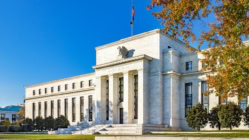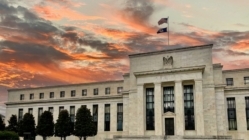
… someone slapped me and explained that the strong dollar has little to do with America being #1 and, more importantly, its continued strengthening is cause for serious concern.
What Is A “Strong Dollar”
The dollar is “strong” when it is worth more compared to the world’s other currencies. For example, in July of 2021, $1 could buy about 110 Japanese Yen. Today, $1 can buy about 137 Japanese Yen.
Similarly, last July, $1 could only buy 0.84 euros, but this July, the dollar and euro are almost equal in value.
Why Is The Dollar So Strong?
Mainstream economists and publications like the WSJ will tell you the dollar is so strong because the U.S. is attracting so much investment due to its higher interest rates and higher levels of safety for investors overall.
Other macro observers like Brent Johnson (Santiago Capital), Jeff Snider (Eurodollar University), and Raoul Pal (Real Vision) explain that it is much more complicated than that.
87% of the world’s trade is in dollars and has been for years, as the dollar is the world’s reserve currency.
In addition, over $13 trillion of dollar-denominated debts are owed by foreigners outside of the U.S.
(so the dollar is not strong because “we’re #1;” it is so strong simply because we defaulted into our extreme reserve-currency-position in ways we never anticipated, making the overall demand for dollars much stronger than we ever anticipated)
As a result, ALL of those countries and debtors have to scramble to find dollars to buy things and/or to service their debts.
For example, if Sri Lanka wants to buy wheat, it has to come up with dollars to buy that wheat.
So, it can either export stuff (e.g. textiles) that people will pay dollars for; it can print more currency to just buy dollars (but that is very inflationary); or it can borrow dollars (but creditors are very hard to come by).
The problem is that there is an enormous dollar shortage in the world right now because the U.S. Fed is tightening and because banks are not lending out dollars across the world (the main source of new money).
And this dollar shortage is pushing up the value of dollars and putting countries across the globe in serious peril. Some countries like Argentina, Sri Lanka, Turkey, and Ecuador are in very serious trouble; they are literally facing economic collapse, as they are unable to garner enough dollars through any means to buy what they need (energy, food, raw materials) on the world market.
Here is a recent Investors Podcast where Brent Johnson explains what is going on with the dollar and why it is so dangerous – with his famous Dollar Milkshake Theory.
And, here is a very recent George Gammon video where he further explains just how dangerous a strengthening dollar can be.
What’s Good About A Strong Dollar? (cheaper imports and foreign travel)
It is good because it makes imported goods much cheaper, which helps tame inflation and makes goods more affordable. This is another major reason inflation will likely come down in fact.
A strong dollar also makes foreign travel much less expensive. As an interesting sidebar, my daughter is going to Europe this summer as a graduation gift and spending $1,000 less than her brother spent five years ago – for the same trip.
A strong dollar can also attract more foreign investments like we saw in the 1980s.
What Is Bad About A Strong Dollar? (more expensive exports; economic, social and political unrest)
A strong dollar makes U.S. exports (like ag products) much more expensive and therefore more difficult to sell to foreigners – and this of course adversely impacts U.S. producers and related jobs.
But – the really scary part, as both George Gammon and Brent Johnson explain, is the risk a very strong dollar poses to other countries – like we are seeing play out in Sri Lanka now.
If countries are not able to raise enough dollars, they face severe shortages, massive inflation and/or very severe economic, social and political unrest (and even violence).
While this is never good on its face because of the human suffering it involves, it is also bad for the U.S. because we could lose the sources of many of the products upon which we rely (and yes, I realize that is almost callous to say in light of the much more severe suffering other countries face).
How Does A Strong Dollar Impact Real Estate?
- More foreign buyers. Even though U.S. real estate is far more expensive now for foreigners because of the strong dollar, the potential economic crises could attract even more foreign real estate buyers nonetheless, as they will want to park money in the somewhat safer U.S. economy.
- Less inflation means lower rates. If the strong dollar makes consumer goods cheaper, as explained above, it could help bring rates down in light of the fact that the bond market responds so strongly to inflation reports.
- Currency crises could really bring down rates. The strong dollar is very likely to spark currency crises that will likely bring down rates, as investors flee to the safety of U.S. Treasuries and other assets. This is something we saw take place again and again after the 2008 meltdown.
But, if the currency crises get very severe and spread across the globe, we could see a severe recession hit everyone including the U.S. and that would not be good for anyone or anything – even if it does bring down rates.
Jay Voorhees
Founder/Broker | JVM Lending
(925) 855-4491 | DRE# 1197176, NMLS# 310167
























